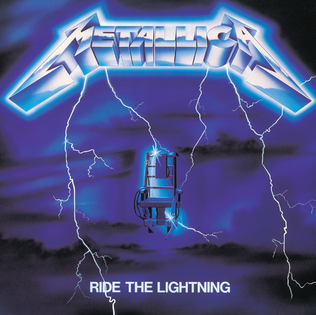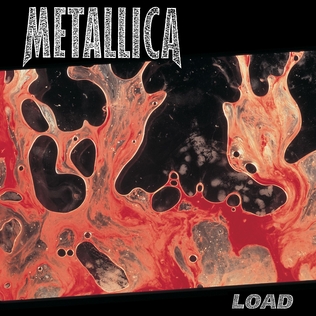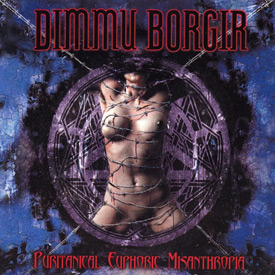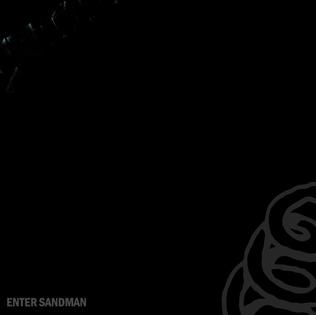
Kirk Lee Hammett is an American musician who has been the lead guitarist and a contributing songwriter for heavy metal band Metallica since 1983. Before joining Metallica, he formed and named the band Exodus. In 2003, Hammett was ranked 11th on Rolling Stone's list of The 100 Greatest Guitarists of All Time. In 2009, Hammett was ranked number 15 in Joel McIver's book The 100 Greatest Metal Guitarists.

Ride the Lightning is the second studio album by American heavy metal band Metallica, released on July 27, 1984, by the independent record label Megaforce Records. The album was recorded in three weeks with producer Flemming Rasmussen at Sweet Silence Studios in Copenhagen, Denmark. The artwork, based on a concept by the band, depicts an electric chair being struck by lightning flowing from the band logo. The title was taken from a passage in Stephen King's novel The Stand, in which a character uses the phrase to refer to execution by electric chair.

Metallica is the fifth studio album by American heavy metal band Metallica. It was released on August 12, 1991, by Elektra Records. Recording sessions took place at One on One Studios in Los Angeles over an eight-month span that frequently found Metallica at odds with their new producer Bob Rock. The album marked a change in the band's music from the thrash metal style of their previous four albums to a slower, heavier, and more refined sound.

Load is the sixth studio album by American heavy metal band Metallica, released on June 4, 1996 by Elektra Records in the United States and by Vertigo Records internationally. The album showed more of a hard rock side of Metallica than the band's typical thrash metal style, which alienated much of the band's fanbase. It also featured influences from genres such as Southern rock, blues rock, country rock, and alternative rock. Drummer Lars Ulrich said about Load's more exploratory nature, "This album and what we're doing with it – that, to me, is what Metallica are all about: exploring different things. The minute you stop exploring, then just sit down and fucking die." At 79 minutes, Load is Metallica's longest studio album.
Thrash metal is an extreme subgenre of heavy metal music characterized by its overall aggression and often fast tempo. The songs usually use fast percussive beats and low-register guitar riffs, overlaid with shredding-style lead guitar work. The lyrical subject matter often includes criticism of The Establishment and concern over environmental destruction, and at times shares a disdain for Christian dogma with that of black metal. The language is typically direct and denunciatory, an approach borrowed from hardcore punk.

...And Justice for All is the fourth studio album by American heavy metal band Metallica, released on September 7, 1988, by Elektra Records. It was the first Metallica album to feature bassist Jason Newsted, following the death of their previous bassist Cliff Burton in 1986. Burton received posthumous co-writing credit on "To Live Is to Die" as Newsted followed bass lines Burton had recorded prior to his death.

Uriah Heep are an English rock band formed in London in 1969. Their current lineup consists of guitarist Mick Box, keyboardist Phil Lanzon, lead vocalist Bernie Shaw, drummer Russell Gilbrook, and bassist Dave Rimmer. They have experienced numerous lineup changes throughout their 54-year career, leaving Box as the only remaining original member. Notable former members of the band are vocalists David Byron, John Lawton, John Sloman and Peter Goalby, bassists Gary Thain, Trevor Bolder, John Wetton, Bob Daisley, Paul Newton, and John Jowitt, drummers Nigel Olsson, Iain Clark, Lee Kerslake and Chris Slade, and keyboardists Ken Hensley, Gregg Dechert and John Sinclair.

Shenanigans is a compilation album by American rock band Green Day, released on July 2, 2002, by Reprise Records. The album contains B-sides, rarities, covers, and the previously unreleased track "Ha Ha You're Dead". "Espionage", a spy-themed instrumental, was featured on the soundtrack for Austin Powers: The Spy Who Shagged Me and "Tired of Waiting for You", their cover of the Kinks song of the same name, was featured on the soundtrack for the 1997 film Private Parts.

Kill 'Em All is the debut studio album by American heavy metal band Metallica, released on July 25, 1983, through the independent label Megaforce Records. Metallica began by playing shows in local clubs in Los Angeles. They recorded several demos to gain attention from club owners and eventually relocated to San Francisco to secure the services of bassist Cliff Burton. The group's No Life 'til Leather demo tape (1982) was noticed by Megaforce label head Jon Zazula, who signed them and provided a budget of $15,000 for recording. The album was recorded in May with producer Paul Curcio at the Music America Studios in Rochester, New York. It was originally intended to be titled Metal Up Your Ass, with cover art featuring a hand clutching a dagger emerging from a toilet bowl. Zazula convinced the band to change the name because distributors feared that releasing an album with such an offensive title and artwork would diminish its chances of commercial success.
Alternative metal is a genre of heavy metal music that combines heavy metal with influences from alternative rock and other genres not normally associated with metal. Alternative metal bands are often characterized by heavily downtuned, mid-paced guitar riffs, a mixture of accessible melodic vocals and harsh vocals and sometimes unconventional sounds within other heavy metal styles. The term has been in use since the 1980s, although it came into prominence in the 1990s.

Savage Amusement is the tenth studio album by the German hard rock band Scorpions, released in 1988. It peaked at No. 5 in the US and was certified platinum by the RIAA on June 20, 1988. It was the last Scorpions record to be produced by Dieter Dierks.

Breaking Benjamin is an American rock band from Wilkes-Barre, Pennsylvania, formed in 1999 by lead singer and guitarist Benjamin Burnley and drummer Jeremy Hummel. The first lineup of the band also included guitarist Aaron Fink and bassist Mark Klepaski. This lineup released two albums, Saturate (2002) and We Are Not Alone (2004), before Hummel was replaced by Chad Szeliga in 2005. The band released two more studio albums, Phobia (2006) and Dear Agony (2009), before entering an extended hiatus in early 2010 due to Burnley's recurring illnesses.

Billy Talent is the debut studio album of Canadian rock band Billy Talent, released in 2003. The band's previous album Watoosh! (1999) was released under their old name Pezz.

The Great Radio Controversy is the second studio album by American hard rock band Tesla, released in 1989. The album's sound has been described as "glam metal to play inside the cab of a tractor-blusey denim and downright wholesome".

Puritanical Euphoric Misanthropia is the fifth studio album by Norwegian black metal band Dimmu Borgir. It was released by Nuclear Blast Records in 2001. This is the first album to feature drummer Nicholas Barker, guitarist Galder, and ICS Vortex on bass. It is also the first album upon which the band used real orchestral instrumentation instead of keyboard lines.

Death Magnetic is the ninth studio album by American heavy metal band Metallica, released on September 12, 2008, through Warner Bros. Records. The album was produced by Rick Rubin, marking the band's first album since ...And Justice for All (1988) not to be produced by longtime collaborator Bob Rock and co-produced by Hetfield and Ulrich. It is also the first Metallica album with bassist Robert Trujillo, and the second to share writing credit to all of the band's members.

End of Green is a German gothic/doom metal band formed in Stuttgart in 1992. According to singer Michael Huber, the band's name implies the end of the color green, which typically symbolizes hope. This fits with the type of music the band produces. The band describes its style as Depressed Subcore. The lyrics are about loneliness, depression, pain and death.

"Enter Sandman" is a song by American heavy metal band Metallica. It is the opening track and lead single from their self-titled fifth album, released in 1991. The music was written by Kirk Hammett, James Hetfield and Lars Ulrich. Vocalist and rhythm guitarist Hetfield wrote the lyrics, which deal with the concept of a child's nightmares.

Hardwired... to Self-Destruct is the tenth studio album by American heavy metal band Metallica, released as a double album on November 18, 2016, by their own label Blackened Recordings. It is their first studio album in eight years following Death Magnetic (2008), marking the longest gap between two studio albums in the band's career. It is also their first studio album released through Blackened. Hardwired... to Self-Destruct was produced by Greg Fidelman, who engineered and mixed Death Magnetic.

The Sick, the Dying... and the Dead! is the sixteenth studio album by American thrash metal band Megadeth, released on September 2, 2022, on frontman Dave Mustaine's Tradecraft label via Universal. It is the first Megadeth album to feature drummer Dirk Verbeuren, the second Megadeth album to feature guitarist Kiko Loureiro, and their first studio album in six years since Dystopia (2016), marking the longest gap between two studio albums in the band's career. In production for more than two years, the album was produced by Mustaine and Chris Rakestraw. During the album's recording, founding bassist David Ellefson was dismissed from the band due to a sex scandal. His bass parts were removed from the album and were re-recorded by Testament bassist Steve Di Giorgio.


















